人教版(2019)必修第三册Unit 2 Morals and Virtues Discovering Useful Structures 课件 (共35张PPT)
文档属性
| 名称 | 人教版(2019)必修第三册Unit 2 Morals and Virtues Discovering Useful Structures 课件 (共35张PPT) | 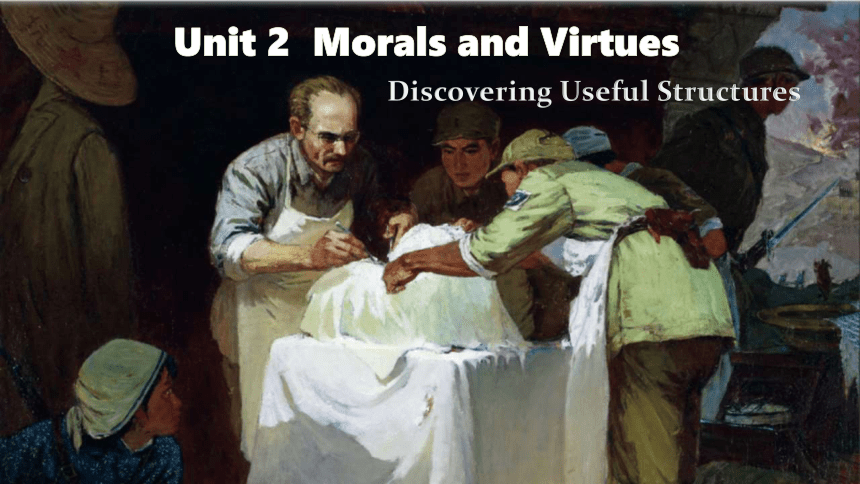 | |
| 格式 | pptx | ||
| 文件大小 | 11.9MB | ||
| 资源类型 | 教案 | ||
| 版本资源 | 人教版(2019) | ||
| 科目 | 英语 | ||
| 更新时间 | 2024-12-23 18:04:06 | ||
图片预览

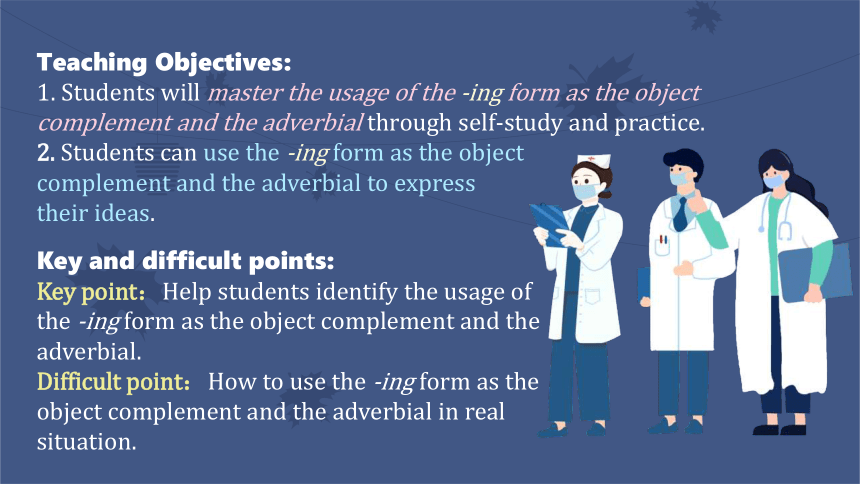

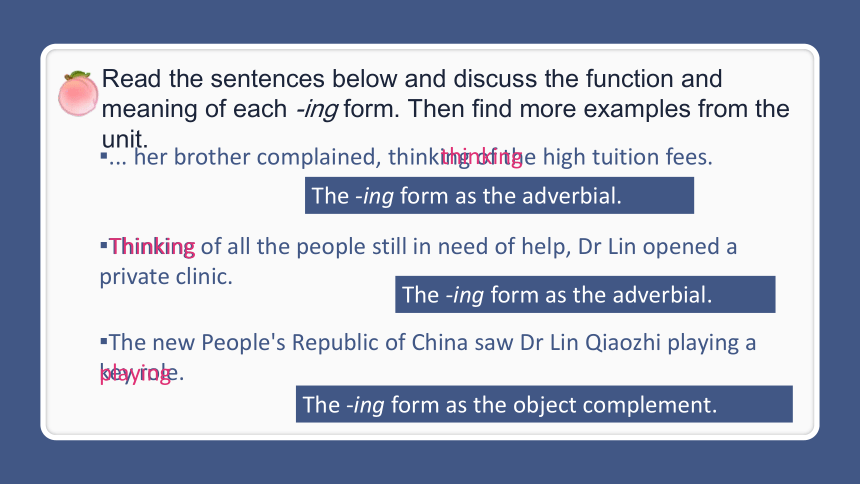
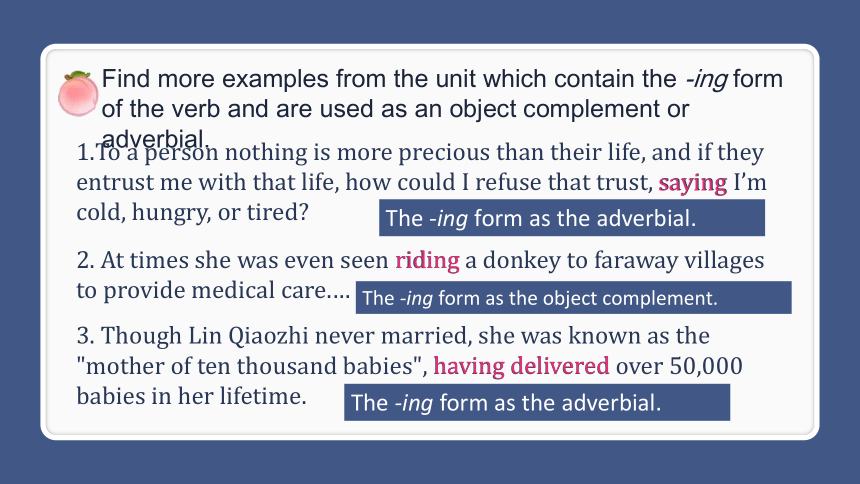
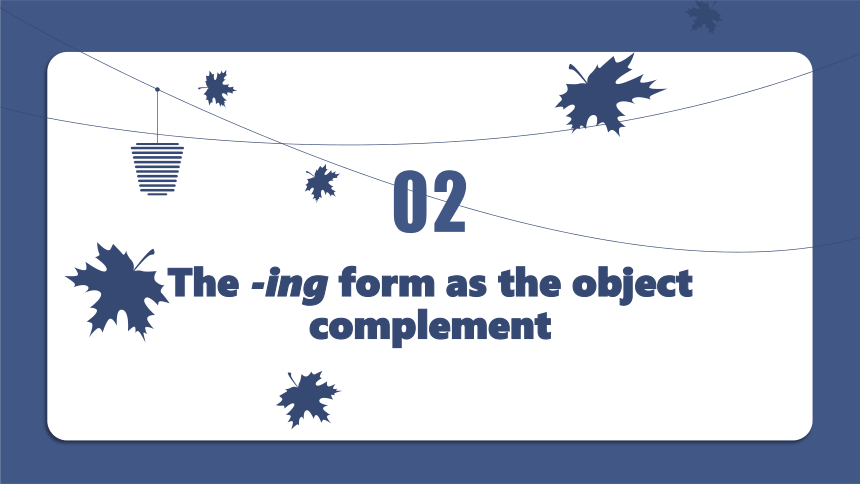

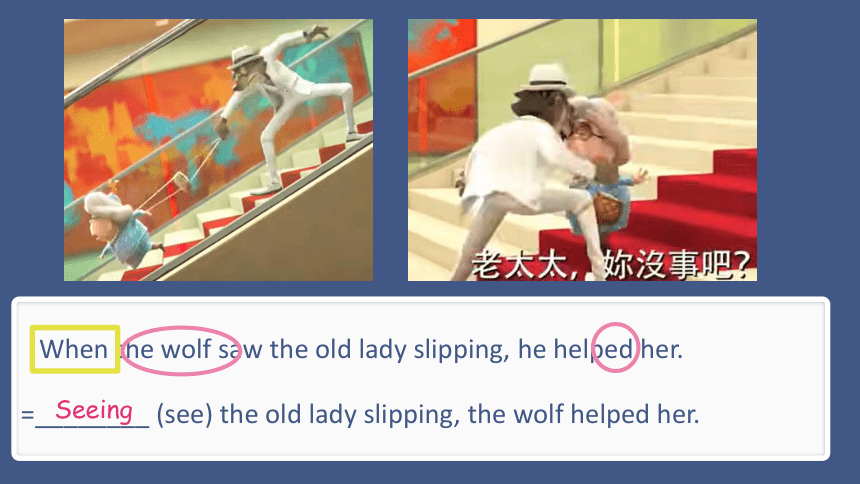


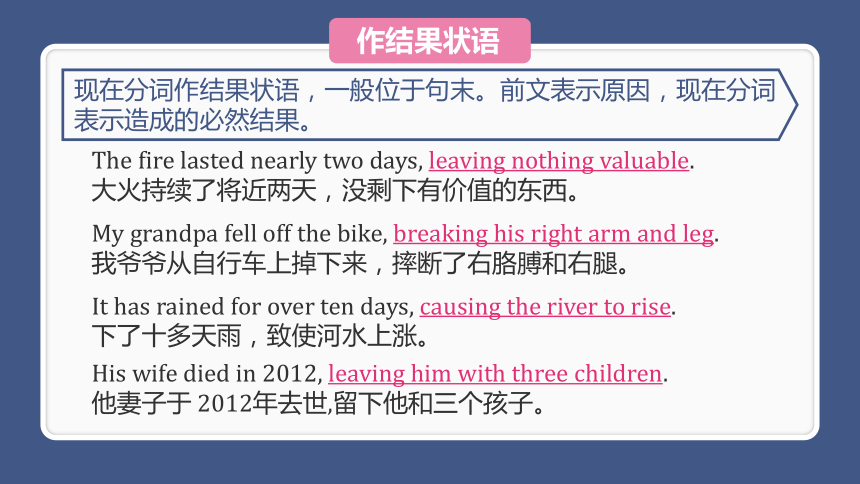
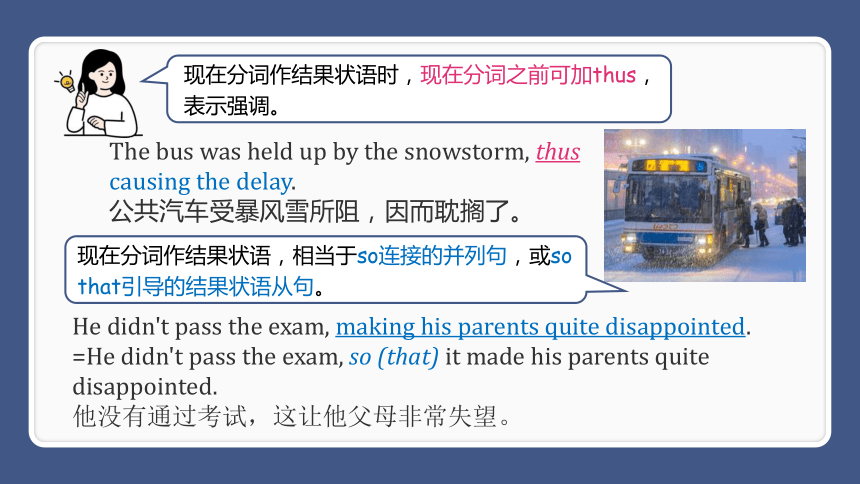
文档简介
(共35张PPT)
Unit 2 Morals and Virtues
Discovering Useful Structures
Teaching Objectives:
1. Students will master the usage of the -ing form as the object
complement and the adverbial through self-study and practice.
2. Students can use the -ing form as the object
complement and the adverbial to express
their ideas.
Key and difficult points:
Key point:Help students identify the usage of
the -ing form as the object complement and the
adverbial.
Difficult point:How to use the -ing form as the
object complement and the adverbial in real
situation.
Lead-in
01
Read the sentences below and discuss the function and meaning of each -ing form. Then find more examples from the unit.
... her brother complained, thinking of the high tuition fees.
The new People's Republic of China saw Dr Lin Qiaozhi playing a key role.
Thinking of all the people still in need of help, Dr Lin opened a private clinic.
thinking
Thinking
playing
The -ing form as the adverbial.
The -ing form as the adverbial.
The -ing form as the object complement.
Find more examples from the unit which contain the -ing form of the verb and are used as an object complement or adverbial.
1.To a person nothing is more precious than their life, and if they entrust me with that life, how could I refuse that trust, saying I’m cold, hungry, or tired
2. At times she was even seen riding a donkey to faraway villages to provide medical care.…
3. Though Lin Qiaozhi never married, she was known as the "mother of ten thousand babies", having delivered over 50,000 babies in her lifetime.
saying
riding
having delivered
The -ing form as the adverbial.
The -ing form as the object complement.
The -ing form as the adverbial.
The -ing form as the object
complement
02
现在分词作状语
现在分词(短语 )在句中可作时间状语、原因状语、条件状语、结果状语、伴随或方式状语、让步状语、评论性状语等。
可以把从句转换为分词短语形式,用以代替原来
的从句。反过来,分词短语作状语,又可以转换
成相应的状语从句或并列句。
When the wolf saw the old lady slipping, he helped her.
=________ (see) the old lady slipping, the wolf helped her.
Seeing
作时间状语
现在分词作时间状语,相当于when, while, after等引导的时间状语从句。
现在分词一般式
现在分词完成式
表示动作与谓语动词表示动作同时或相继发生。
Hearing the exciting news, we jumped with joy.
听到这个令人振奋的消息时,我们高兴地跳了起来。
表示动作先于谓语动词表示动作发生。
Having finished the housework, she got ready to go shopping.
做完家务活之后,她准备去购物。
作原因状语
现在分词作原因状语,相当于because, since, as等引导的原因状语从句。
现在分词完成式
现在分词一般式
原因通常早于结果,故现在分词多用完成式。
Living far from the company, Josie has to get up early every morning.
由于住得离公司远,乔茜每天早晨只好早起。。
对于静态动词,如感知、认知动词know, see, realise, find, think等以及be动词,多用一般式。
Having smoked too much, he has suffered from lung cancer.
由于抽烟太多,他患了肺癌。
作结果状语
现在分词作结果状语,一般位于句末。前文表示原因,现在分词表示造成的必然结果。
The fire lasted nearly two days, leaving nothing valuable.
大火持续了将近两天,没剩下有价值的东西。
My grandpa fell off the bike, breaking his right arm and leg.
我爷爷从自行车上掉下来,摔断了右胳膊和右腿。
It has rained for over ten days, causing the river to rise.
下了十多天雨,致使河水上涨。
His wife died in 2012, leaving him with three children.
他妻子于 2012年去世,留下他和三个孩子。
现在分词作结果状语时,现在分词之前可加thus,表示强调。
The bus was held up by the snowstorm, thus causing the delay.
公共汽车受暴风雪所阻,因而耽搁了。
现在分词作结果状语,相当于so连接的并列句,或so that引导的结果状语从句。
He didn't pass the exam, making his parents quite disappointed.
=He didn't pass the exam, so (that) it made his parents quite disappointed.
他没有通过考试,这让他父母非常失望。
作伴随状语
现在分词作伴随状语可位于句首或句末,表示与谓语动词表示的动作同时发生。现在分词是谓语动词表示动作的陪衬动作。
The professor put a finger in his mouth , tasted it and smiled, looking rather pleased.
教授把一根手指放进嘴里,尝了尝,然后笑了,看起来很高兴。
"Don't you know I'm one of you " asked the bat, showing his teeth.
"难道你们不知道我是你们的成员之一吗 "蝙蝠露出牙齿问。
I was in the kitchen cooking something.
我在厨房者东西。
现在分词作伴随状语,往往带有目的性,即目的和伴随兼而有之。多放于句末,且与主句用逗号隔开。
Many young farmers hunted around from city to city, hoping to get good jobs.
许多年轻的农民辗转于各个城市,希望能找到好工作。
He waited impatiently, expecting his friend could come earlier.
他不耐烦地等待着,希望他朋友能早点来。
She kept it a secret, trying not to lose her job.
她对此保守秘密,尽量别丢掉工作。
作方式状语
Using a stick, Ma Liang drew a horse on the ground in ten minutes.
马良用一根枝条十分钟之内就在地上画了一匹马。
Holding his head high, the hero walked past the enemies.
那位英雄高昂着头从敌人身边走过。
The visitor from Japan comes in smiling.
那位来自日本的客人笑着进来了。
现在分词作伴随或方式状语时,一般不能转化为状语从句,但可以转化成并列句。
My friend was seated in the sofa, reading a magazine.
=My friend was seated in the sofa and she was reading a magazine.
我的妻子坐在沙发上,读着一本杂志。
作条件状语
现在分词作条件状语,相当于if引导的条件状语从句。通常使用一般式,位于句首。
Going straight down the road, you will find the hospital.
沿着这条路直走,你就会找到那家医院。
Working hard at your lessons, you are to succeed.
如果你努力学习,你就一定会成功的。
"祈使句 +and+ 简单句"也具有上述用法。
Going straight down the road, you will find the hospital.
→Go straight down the road, and you will find the hospital.
作让步状语
现在分词作让步状语,相当于though/although, even if/even though等引导的让步状语从句,此用法相对少见。
Having failed many times, I still have faith in my future.
=Though I have failed many times , I still have faith in my future.
尽管失败多次,我仍然对未来充满信心。
Admitting that she has made some progress, I still don't think she has tried his best.
我承认她取得了一些进步,但我仍然认为她没有尽力。
作程度状语
在一些习惯用法中,现在分词可以作程度状语,意为"很,非常,极度",相当于程度副词very, extremely等。
I was boiling hot and sweaty. 我浑身滚烫,大汗淋漓。
It's freezing cold today for October.
对于十月份来说,今天天气太冷了
It was burning hot yesterday. 昨天非常炎热。
Lanny is an amazing beautiful girl. 兰妮是一个非常漂亮的姑娘。
The -ing form as the adverbial
03
现在分词作宾语补足语
现在分词除了作状语、定语和表语外,还可以作宾语补足语,说明宾语怎么样或正在进行的动作。
形容词性质的现在分词(分词形容词)作宾补
一些表示"观点,认知"的动词,如think, consider, believe, find, feel等,都可以接这类复合宾语。
We think the report very encouraging. 我们认为这个报告非常鼓舞人。
I considered the book rather boring. 我认为这本书相当枯燥。
They all feel the result of the game disappointing.
他们都觉得比赛结果令人失望。
动作性质的现在分词作宾补
感官动词see, hear, feel, smell, watch, notice, observe, discover,
find, listen to, look at, catch等,可以接现在分词作宾补。
Someone saw Amy watering flowers in the garden.
有人看见艾米正在花园里浇花。
She heard someone singing next door. 她听到隔壁有人正在唱歌。
I caught him reading my private letters.
我发现他在偷看我的私人信件。
感官动词后面可跟现在分词作宾补,也可跟不带to的不定式作宾补。现在分词表示正在进行的动作,不定式表示动作的全过程或结果。
(听的时候门铃正在响)
I heard the doorbell ringing. 我听见门铃在响。
I heard someone knock at the door. 我听见有人敲门了。
(敲门的动作已完成)
现在分词作感官动词的宾补时,不能使用完成式。
He saw the house having burned.
He saw the house burning.
动作性质的现在分词作宾补
使役动词have, get, set, leave, keep等,可以接现在分词作宾补。
I can't have you wasting water like that.
我不能让你那样浪费水。
Don't keep your children learning all day.
不要让你的孩子整天都在学习。
It was cold, so they left the fire burning all the night.
天气很冷,所以他们让炉火整夜燃烧着。
在“with + 宾语 + 现在分词”结构中,现在分词充当了with宾语的补足语
Mary felt very shy with so many eyes looking at her.
有这么多双眼睛看着她,玛丽感到很害羞。
With prices going up so fast, we can't afford luxuries.
物价上涨这么快,我们买不起奢侈品。
现在分词(doing)作宾补
过去分词 (done)作宾补
现在分词作宾补,宾语是动作的执行者
I saw the dog following a man. 我看见那只狗跟在一个人的身后。
过去分词作宾补,宾语是动作的承受者
I saw the dog followed by a man. 我看见那只狗有人在后面跟着。
过去分词(done)作宾补
现在分词(doing) 作宾补
不定式(do)作宾补
不定式表示动作的全过程或结果
I have seen Milla grow up from childhood, so I know her quite well.
我看着米拉从小长大,因此很了解她。
现在分词表示主动和正在进行
Some students last saw Reed playing near an Internet bar.
几个学生最后看见瑞德时他正在一家网吧附近玩耍。
过去分词表示被动或完成
They want to see this matter settled immediately.
他们希望看到这个问题立刻解决。
过去分词(done) 作宾补
现在分词被动式
(being done)
作宾补
She heard her name called just a moment ago.
刚才她听见有人叫过她的名字
She heard her name being called from behind and stopped to look back.
她听见有人在后面一直叫她的名字,就停下来向后看。
(called是过去分词作宾补,表示“被动和完成”)
(being called是现在分词的被动语态作宾补,表示“被动和进行”)
Practice
04
从括号中选择正确的动词形式填空
1. _____________________ the past year as an exchange student in Hong Kong, Linda appears more mature than those of her age. (Spending, Having spent)
2. _____________________ which university to attend, the girl asked her teacher for advice. (Not knowing, Knowing not)
3. There is no greater pleasure than lying on the grassland, _____________ at the night sky. (to stare, staring)
4. ______________ the old photos, I recalled my childhood. (To see, Seeing )
5. Remember not to mention this while ______________ to her. (talk, talking)
6. _______________________ to work overtime that evening, I missed a wonderful film. (Having asked, Having been asked)
7. Tony lent me the money, _______________ that I'd do as much for him. (hoping, to hope)
Having spent
Not knowing
staring
Seeing
talking
Having been asked
hoping
Complete the sentences with the correct forms of the verbs in the box.
Hearing
worrying
wanting
knocking
Facing
Returning
smiling
Feeling
Read the following story and rewrite the underlined parts using the -ing form.
deciding to
become a doctor
after hearing that many
people were dying in the war
Helping to organise hospitals,
he taught doctors and nurses , and showed
people how to give first aid.
praising Dr Bethune as a hero to be
remembered in China
SEE YOU NEXT TIME
Unit 2 Morals and Virtues
Discovering Useful Structures
Teaching Objectives:
1. Students will master the usage of the -ing form as the object
complement and the adverbial through self-study and practice.
2. Students can use the -ing form as the object
complement and the adverbial to express
their ideas.
Key and difficult points:
Key point:Help students identify the usage of
the -ing form as the object complement and the
adverbial.
Difficult point:How to use the -ing form as the
object complement and the adverbial in real
situation.
Lead-in
01
Read the sentences below and discuss the function and meaning of each -ing form. Then find more examples from the unit.
... her brother complained, thinking of the high tuition fees.
The new People's Republic of China saw Dr Lin Qiaozhi playing a key role.
Thinking of all the people still in need of help, Dr Lin opened a private clinic.
thinking
Thinking
playing
The -ing form as the adverbial.
The -ing form as the adverbial.
The -ing form as the object complement.
Find more examples from the unit which contain the -ing form of the verb and are used as an object complement or adverbial.
1.To a person nothing is more precious than their life, and if they entrust me with that life, how could I refuse that trust, saying I’m cold, hungry, or tired
2. At times she was even seen riding a donkey to faraway villages to provide medical care.…
3. Though Lin Qiaozhi never married, she was known as the "mother of ten thousand babies", having delivered over 50,000 babies in her lifetime.
saying
riding
having delivered
The -ing form as the adverbial.
The -ing form as the object complement.
The -ing form as the adverbial.
The -ing form as the object
complement
02
现在分词作状语
现在分词(短语 )在句中可作时间状语、原因状语、条件状语、结果状语、伴随或方式状语、让步状语、评论性状语等。
可以把从句转换为分词短语形式,用以代替原来
的从句。反过来,分词短语作状语,又可以转换
成相应的状语从句或并列句。
When the wolf saw the old lady slipping, he helped her.
=________ (see) the old lady slipping, the wolf helped her.
Seeing
作时间状语
现在分词作时间状语,相当于when, while, after等引导的时间状语从句。
现在分词一般式
现在分词完成式
表示动作与谓语动词表示动作同时或相继发生。
Hearing the exciting news, we jumped with joy.
听到这个令人振奋的消息时,我们高兴地跳了起来。
表示动作先于谓语动词表示动作发生。
Having finished the housework, she got ready to go shopping.
做完家务活之后,她准备去购物。
作原因状语
现在分词作原因状语,相当于because, since, as等引导的原因状语从句。
现在分词完成式
现在分词一般式
原因通常早于结果,故现在分词多用完成式。
Living far from the company, Josie has to get up early every morning.
由于住得离公司远,乔茜每天早晨只好早起。。
对于静态动词,如感知、认知动词know, see, realise, find, think等以及be动词,多用一般式。
Having smoked too much, he has suffered from lung cancer.
由于抽烟太多,他患了肺癌。
作结果状语
现在分词作结果状语,一般位于句末。前文表示原因,现在分词表示造成的必然结果。
The fire lasted nearly two days, leaving nothing valuable.
大火持续了将近两天,没剩下有价值的东西。
My grandpa fell off the bike, breaking his right arm and leg.
我爷爷从自行车上掉下来,摔断了右胳膊和右腿。
It has rained for over ten days, causing the river to rise.
下了十多天雨,致使河水上涨。
His wife died in 2012, leaving him with three children.
他妻子于 2012年去世,留下他和三个孩子。
现在分词作结果状语时,现在分词之前可加thus,表示强调。
The bus was held up by the snowstorm, thus causing the delay.
公共汽车受暴风雪所阻,因而耽搁了。
现在分词作结果状语,相当于so连接的并列句,或so that引导的结果状语从句。
He didn't pass the exam, making his parents quite disappointed.
=He didn't pass the exam, so (that) it made his parents quite disappointed.
他没有通过考试,这让他父母非常失望。
作伴随状语
现在分词作伴随状语可位于句首或句末,表示与谓语动词表示的动作同时发生。现在分词是谓语动词表示动作的陪衬动作。
The professor put a finger in his mouth , tasted it and smiled, looking rather pleased.
教授把一根手指放进嘴里,尝了尝,然后笑了,看起来很高兴。
"Don't you know I'm one of you " asked the bat, showing his teeth.
"难道你们不知道我是你们的成员之一吗 "蝙蝠露出牙齿问。
I was in the kitchen cooking something.
我在厨房者东西。
现在分词作伴随状语,往往带有目的性,即目的和伴随兼而有之。多放于句末,且与主句用逗号隔开。
Many young farmers hunted around from city to city, hoping to get good jobs.
许多年轻的农民辗转于各个城市,希望能找到好工作。
He waited impatiently, expecting his friend could come earlier.
他不耐烦地等待着,希望他朋友能早点来。
She kept it a secret, trying not to lose her job.
她对此保守秘密,尽量别丢掉工作。
作方式状语
Using a stick, Ma Liang drew a horse on the ground in ten minutes.
马良用一根枝条十分钟之内就在地上画了一匹马。
Holding his head high, the hero walked past the enemies.
那位英雄高昂着头从敌人身边走过。
The visitor from Japan comes in smiling.
那位来自日本的客人笑着进来了。
现在分词作伴随或方式状语时,一般不能转化为状语从句,但可以转化成并列句。
My friend was seated in the sofa, reading a magazine.
=My friend was seated in the sofa and she was reading a magazine.
我的妻子坐在沙发上,读着一本杂志。
作条件状语
现在分词作条件状语,相当于if引导的条件状语从句。通常使用一般式,位于句首。
Going straight down the road, you will find the hospital.
沿着这条路直走,你就会找到那家医院。
Working hard at your lessons, you are to succeed.
如果你努力学习,你就一定会成功的。
"祈使句 +and+ 简单句"也具有上述用法。
Going straight down the road, you will find the hospital.
→Go straight down the road, and you will find the hospital.
作让步状语
现在分词作让步状语,相当于though/although, even if/even though等引导的让步状语从句,此用法相对少见。
Having failed many times, I still have faith in my future.
=Though I have failed many times , I still have faith in my future.
尽管失败多次,我仍然对未来充满信心。
Admitting that she has made some progress, I still don't think she has tried his best.
我承认她取得了一些进步,但我仍然认为她没有尽力。
作程度状语
在一些习惯用法中,现在分词可以作程度状语,意为"很,非常,极度",相当于程度副词very, extremely等。
I was boiling hot and sweaty. 我浑身滚烫,大汗淋漓。
It's freezing cold today for October.
对于十月份来说,今天天气太冷了
It was burning hot yesterday. 昨天非常炎热。
Lanny is an amazing beautiful girl. 兰妮是一个非常漂亮的姑娘。
The -ing form as the adverbial
03
现在分词作宾语补足语
现在分词除了作状语、定语和表语外,还可以作宾语补足语,说明宾语怎么样或正在进行的动作。
形容词性质的现在分词(分词形容词)作宾补
一些表示"观点,认知"的动词,如think, consider, believe, find, feel等,都可以接这类复合宾语。
We think the report very encouraging. 我们认为这个报告非常鼓舞人。
I considered the book rather boring. 我认为这本书相当枯燥。
They all feel the result of the game disappointing.
他们都觉得比赛结果令人失望。
动作性质的现在分词作宾补
感官动词see, hear, feel, smell, watch, notice, observe, discover,
find, listen to, look at, catch等,可以接现在分词作宾补。
Someone saw Amy watering flowers in the garden.
有人看见艾米正在花园里浇花。
She heard someone singing next door. 她听到隔壁有人正在唱歌。
I caught him reading my private letters.
我发现他在偷看我的私人信件。
感官动词后面可跟现在分词作宾补,也可跟不带to的不定式作宾补。现在分词表示正在进行的动作,不定式表示动作的全过程或结果。
(听的时候门铃正在响)
I heard the doorbell ringing. 我听见门铃在响。
I heard someone knock at the door. 我听见有人敲门了。
(敲门的动作已完成)
现在分词作感官动词的宾补时,不能使用完成式。
He saw the house having burned.
He saw the house burning.
动作性质的现在分词作宾补
使役动词have, get, set, leave, keep等,可以接现在分词作宾补。
I can't have you wasting water like that.
我不能让你那样浪费水。
Don't keep your children learning all day.
不要让你的孩子整天都在学习。
It was cold, so they left the fire burning all the night.
天气很冷,所以他们让炉火整夜燃烧着。
在“with + 宾语 + 现在分词”结构中,现在分词充当了with宾语的补足语
Mary felt very shy with so many eyes looking at her.
有这么多双眼睛看着她,玛丽感到很害羞。
With prices going up so fast, we can't afford luxuries.
物价上涨这么快,我们买不起奢侈品。
现在分词(doing)作宾补
过去分词 (done)作宾补
现在分词作宾补,宾语是动作的执行者
I saw the dog following a man. 我看见那只狗跟在一个人的身后。
过去分词作宾补,宾语是动作的承受者
I saw the dog followed by a man. 我看见那只狗有人在后面跟着。
过去分词(done)作宾补
现在分词(doing) 作宾补
不定式(do)作宾补
不定式表示动作的全过程或结果
I have seen Milla grow up from childhood, so I know her quite well.
我看着米拉从小长大,因此很了解她。
现在分词表示主动和正在进行
Some students last saw Reed playing near an Internet bar.
几个学生最后看见瑞德时他正在一家网吧附近玩耍。
过去分词表示被动或完成
They want to see this matter settled immediately.
他们希望看到这个问题立刻解决。
过去分词(done) 作宾补
现在分词被动式
(being done)
作宾补
She heard her name called just a moment ago.
刚才她听见有人叫过她的名字
She heard her name being called from behind and stopped to look back.
她听见有人在后面一直叫她的名字,就停下来向后看。
(called是过去分词作宾补,表示“被动和完成”)
(being called是现在分词的被动语态作宾补,表示“被动和进行”)
Practice
04
从括号中选择正确的动词形式填空
1. _____________________ the past year as an exchange student in Hong Kong, Linda appears more mature than those of her age. (Spending, Having spent)
2. _____________________ which university to attend, the girl asked her teacher for advice. (Not knowing, Knowing not)
3. There is no greater pleasure than lying on the grassland, _____________ at the night sky. (to stare, staring)
4. ______________ the old photos, I recalled my childhood. (To see, Seeing )
5. Remember not to mention this while ______________ to her. (talk, talking)
6. _______________________ to work overtime that evening, I missed a wonderful film. (Having asked, Having been asked)
7. Tony lent me the money, _______________ that I'd do as much for him. (hoping, to hope)
Having spent
Not knowing
staring
Seeing
talking
Having been asked
hoping
Complete the sentences with the correct forms of the verbs in the box.
Hearing
worrying
wanting
knocking
Facing
Returning
smiling
Feeling
Read the following story and rewrite the underlined parts using the -ing form.
deciding to
become a doctor
after hearing that many
people were dying in the war
Helping to organise hospitals,
he taught doctors and nurses , and showed
people how to give first aid.
praising Dr Bethune as a hero to be
remembered in China
SEE YOU NEXT TIME
